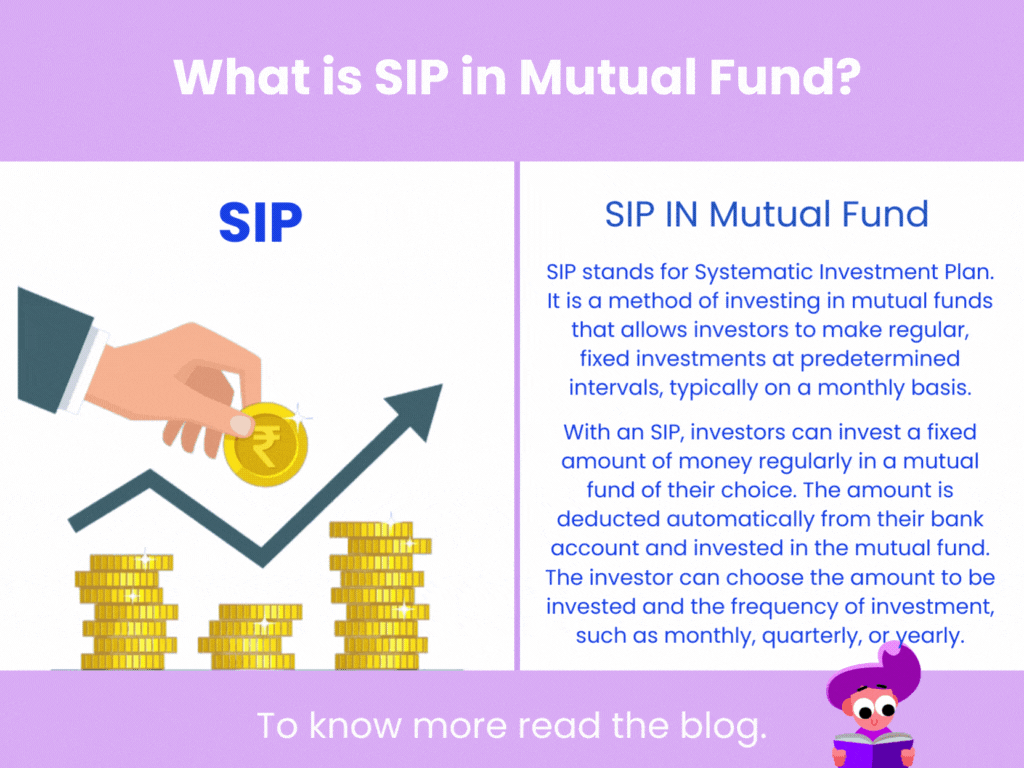What is SIP in Mutual Fund?
SIP stands for Systematic Investment Plan. It is a method of investing in mutual funds that allows investors to make regular, fixed investments at predetermined intervals, typically on a monthly basis.
With an SIP, investors can invest a fixed amount of money regularly in a mutual fund of their choice. The amount is deducted automatically from their bank account and invested in the mutual fund. The investor can choose the amount to be invested and the frequency of investment, such as monthly, quarterly, or yearly.
SIPs help investors to invest in a disciplined and regular manner, regardless of market conditions. It also helps in reducing the average cost of investment by enabling investors to purchase more units when the market is low and fewer units when the market is high.
SIPs are a popular investment option for retail investors who want to invest in mutual funds but may not have a large lump sum amount to invest. By investing a small amount regularly over a long period of time, investors can accumulate a significant corpus of wealth.
Here's how SIP works:
Regular Investment: With SIP, an investor commits to investing a fixed amount of money at regular intervals, typically monthly or quarterly. The investment amount can be as low as a few hundred rupees, making it an accessible investment option for individuals with different financial capabilities.
Rupee-Cost Averaging: SIPs follow the principle of rupee-cost averaging. When you invest a fixed amount regularly, you end up buying more units of the mutual fund when prices are low and fewer units when prices are high. Over time, this strategy helps in lowering the average cost per unit and potentially enhances returns.
Professional Fund Management: The money pooled through SIPs is managed by professional fund managers who invest in a diversified portfolio of stocks, bonds, or other securities, depending on the type of mutual fund chosen. This allows investors to access professional expertise in managing their investments.
Flexibility: SIPs offer flexibility in terms of the investment amount and tenure. Investors can increase or decrease the investment amount or stop the SIP at any time without any penalties.
Power of Compounding: By staying invested over the long term, investors can benefit from the power of compounding, where their money earns returns on both the principal amount and the previously earned returns.
SIPs are a popular investment tool for long-term wealth creation, financial goals like retirement planning, children's education, buying a house, etc. They are well-suited for investors who do not want to time the market and prefer a disciplined and systematic approach to investing.
SIPs are a popular investment method in India, and many mutual fund companies offer SIP options for their funds. Investors can choose the frequency of investment, the amount to be invested, and the duration of the SIP as per their investment goals and risk appetite. SIPs are a flexible investment option, and investors can modify or stop their investments at any time, depending on their financial circumstances.
SIPs are available for various types of mutual funds such as equity funds, debt funds, hybrid funds, and others. It is important to choose a mutual fund that matches your investment objectives and risk profile before starting an SIP.


